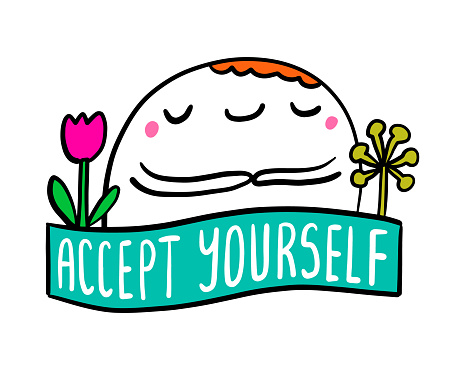Learning to be OK with all the pieces of you can be hard, but with some practice, you can learn the art of self-acceptance.
While there are always ways to improve and better ourselves, in the end, we are who we are.
After all, who doesn’t have good qualities they’re proud of and flaws they could do without? And we each experience success or failure at different times in our lives.
Learning to accept yourself for who you are can bring peace and calm to your life.
How to accept yourself
- Forgive yourself
- Practice self-compassion
- Use present moment awareness and mindfulness
- Acknowledge and love your abilities
- Ignore your inner critic
- Connect with loved ones who appreciate you
- Move on from disappointments
- Gain perspective on your limitations
 |
| Smiling with my scars |
Self-esteem refers to having confidence in your qualities and abilities. A person with higher self-esteem might feel worthy of good and positive experiences and feel able to handle difficult situations.
In a
2017 study based on data from 201 adolescents, researchers observed that a person’s self-esteem was linked to them having fewer symptoms of anxiety, depression, and attention problems.While self-esteem and self-acceptance are connected, self-acceptance refers to the act of embracing every aspect of yourself — strengths and weaknesses.
You might think of it this way: Self-esteem is the quality of fuel you use, and self-acceptance is how you drive on that tank of fuel.
From the moment we’re born, how we fit into the world is determined and highly influenced by our caregivers.
This gives them a lot of power in terms of how we understand and see ourselves. For instance, if your caregiver encouraged, loved, and accepted you, your self-acceptance will often be much different from a child who experienced the opposite.
When we start school, we’re measured by how well we perform on tests and in class, as well as how we assimilate with our peers. All this can contribute to self-worth and acceptance.
As we get older, life circumstances, relationships, and how we’re treated by others can influence how readily we accept ourselves.
It can be hard for many of us to accept ourselves if:
- diversity, equity, and inclusion are low where you live
- imposter syndrome has been at play in your life
- you’ve engaged in harmful behaviors that had consequences
- trauma has made it difficult to embrace your past or present
No matter how your self-acceptance was shaped up until this point, there are practical ways to work on accepting yourself, right now, just as you are.


No comments:
Post a Comment